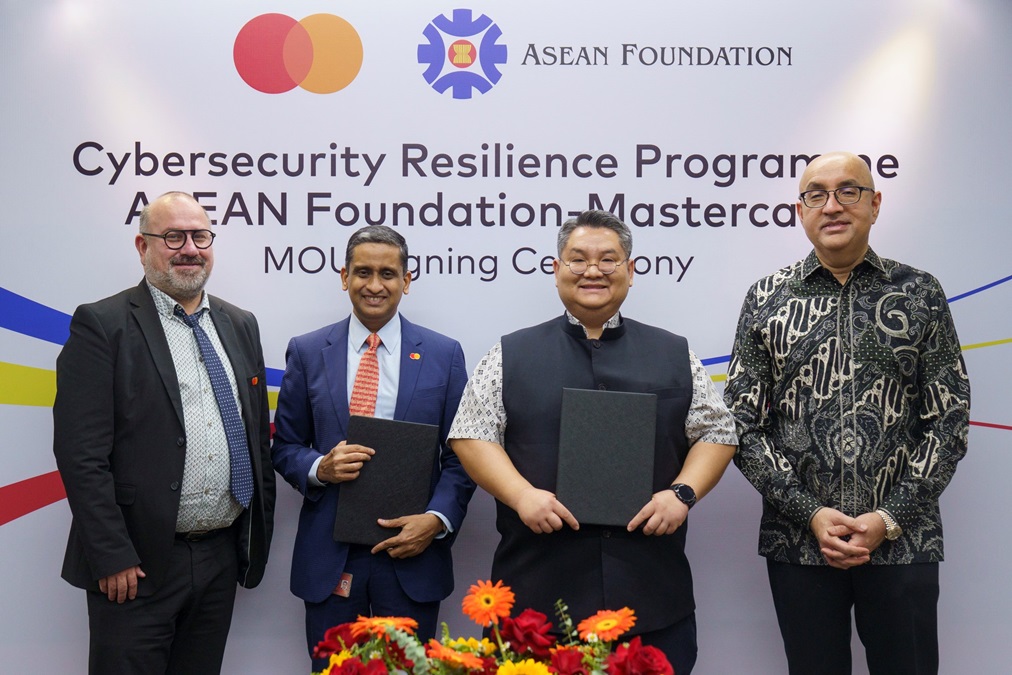Mastercard recently signed a Memorandum of Understanding (MoU) with the ASEAN Foundation, an intergovernmental organisation within the Association of Southeast Asian Nations (ASEAN), to roll out a range of initiatives across the bloc’s member states to improve the cybersecurity capabilities of public sector entities and small and medium-sized enterprises (SMEs).
As part of this collaboration called the ASEAN Foundation-Mastercard Cybersecurity Resilience Program, the parties will focus on three main pillars: raising awareness, providing skills and training, and improving capacity through technology and intelligence.

This collaboration is timely as cybersecurity was featured prominently in Malaysia’s recent Budget 2025 as an area of strategic focus. The government has allocated an additional RM30 million in Budget 2025 to roll out measures to strengthen cybersecurity and digital skills. These measures reflect a comprehensive approach to safeguarding Malaysia’s digital infrastructure and equipping its workforce with essential cybersecurity skills, mirroring the objectives of the ASEAN Foundation-Mastercard Cybersecurity Resilience Program.
This collaboration will therefore complement Malaysia’s national efforts by delivering targeted training and resources to bolster the cybersecurity resilience of SMEs and public sector organizations within the country.
In the private sector, the programme’s initiatives will be geared towards the region’s SMEs, which account for more than 97 per cent of all businesses in the region and provide 85 per cent of the employment. Initiatives include:
- Equipping SMEs to manage cyber incidents via the Mastercard Trust Center, an online self-service portal that provides free education, resources, and tools to support their cybersecurity
- Enabling SMEs to identify vulnerabilities in their operations through Mastercard’s My Cyber Risk, a tool that allows businesses to pinpoint, prioritize and act on cybersecurity threats to digital infrastructure.
- Keeping SMEs up-to-date about emerging threats and issues through cybersecurity workshops and webinars, as well as industry events on cybersecurity-related
In the public sector, the alliance will drive crucial activities to ensure its preparedness, including:
- Running cybersecurity webinars specifically designed for the challenges faced by ASEAN governments, providing expertise on key issues for public sector professionals in cybersecurity-related roles.
- Conducting crisis simulation exercises to identify the cyber readiness and resilience of organisational technologies and processes, and to highlight areas where capabilities can be
- Developing research reports, providing risk assessment tools for ASEAN governments and fostering public-private dialogues and collaboration to fight fraud.
These initiatives are part of ASEAN’s ongoing efforts to enhance the region’s cybersecurity capabilities, cyber capacity-building, and cybercrime information-sharing for member states.
Satvinder Singh, deputy secretary-general of ASEAN for the ASEAN Economic Community, said, “Achieving ASEAN’s Digital Economy vision will involve enhanced regional integration to enable businesses to operate seamlessly while offering consumers efficient and secure digital services, including e-payments solutions. At the heart of this transformation lies the need to strengthen cyber resilience in the ever-evolving nature of cyber threats, which have become increasingly sophisticated and pervasive.”
He added, “I would also like to commend Mastercard and the ASEAN Foundation for its leadership in spearheading the cybersecurity initiatives. Given the Mastercard’s active role in cross-border payment solutions, which profoundly impact business and social activities globally, your cutting-edge financial and security innovations are indispensable to global and regional cyber resilience and digital trust.”
“The ASEAN Foundation-Mastercard Cybersecurity Resilience Program is a major step forward in strengthening our region’s cybersecurity capabilities. As cyber threats grow more sophisticated, it’s crucial that we help our member states not only build stronger defenses but also enhance their ability to share critical information and collaborate across borders. This programme empowers us to take a united approach, boosting both skills and resources, so we can tackle cyber challenges together. By working closely, we’re not just safeguarding our digital future but ensuring ASEAN remains competitive and resilient in the ever-evolving global cybersecurity landscape,” said Dr Piti Srisangnam, executive director of ASEAN Foundation.
South East Asia has seen rapid expansion in its digital economy, with an annual compounded growth rate of 27 per cent since 2021. While regional investment in cybersecurity has been growing 14 per cent annually since 2021 and is expected to reach US$6.1 billion by 2026, these figures are insufficient to properly tackle the region’s fast-growing cybercrime, which saw an increase of 82 per cent between 2021 and 2022, according to Singapore’s Ministry of Defence. At the same time, SMEs are especially targeted by attackers who exploit weaker security measures in these smaller businesses.
In Malaysia, while suspicious transactions of more than RM380 million have been successfully intercepted, financial scams remain a serious concern as the number of cases continues to rise. One-third of Malaysian organisations reported a 50 per cent or more increase in cybersecurity incidents over the past year, with ransomware and malware causing the greatest concern.
Safdar Khan, Mastercard’s division president for South East Asia, said, “Enhancing cybersecurity capacity and expertise is necessary to navigate today’s rapidly evolving digital threats and build a strong digital economy. This significant collaboration with the ASEAN Foundation to strengthen cybersecurity capabilities throughout Southeast Asia underscores Mastercard’s commitment to bolster trust in the digital world. By delivering impactful initiatives for both public sector and SMEs, this collaboration will contribute towards a secure, resilient digital ecosystem for all participants, enabling countless new opportunities for individuals and businesses, and accelerating inclusive growth in Southeast Asia, including Malaysia.”
Mastercard has been at the forefront of enhancing cybersecurity and fostering digital trust, globally and across Southeast Asia. The company collaborates with various industries, as well as public and private sectors to combat the rise of cybercrime.
In Southeast Asia, these include the United Nations Development Program’s Global Coalition Against Digital Scams, as well as the Global Anti Scam Alliance where Mastercard serves as the Chair.
In addition, Mastercard has collaborated with various organisations to boost cybersecurity capabilities and talent in South East Asia, such as the joint FlexiMasters program in cybersecurity and digital trust with Singapore’s Nanyang Technological University, and the Indosat-Mastercard Cybersecurity Center of Excellence in Indonesia.
Source: Mastercard (Press Release)




